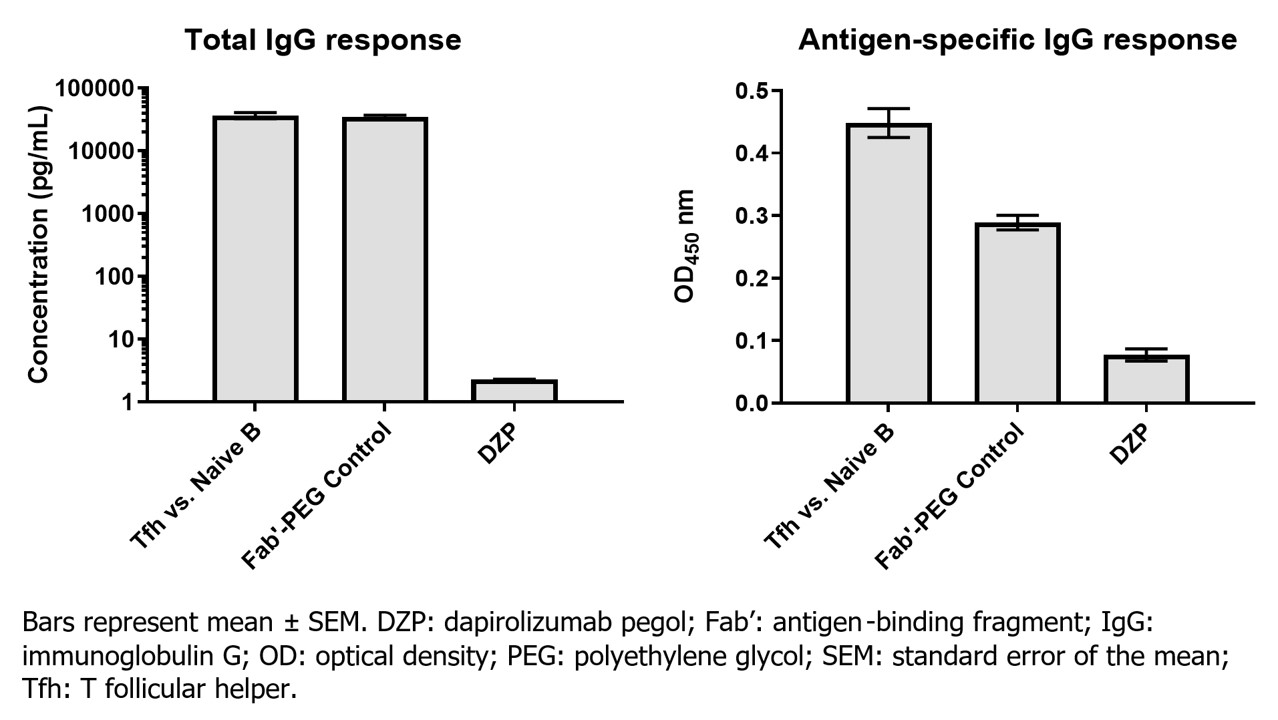Session Information
Session Type: Poster Session C
Session Time: 10:30AM-12:30PM
Background/Purpose: The pivotal role of CD40-CD40L interactions in systemic lupus erythematosus (SLE) pathogenesis stems from the orchestration of a range of immune and inflammatory responses involving T cells, B cells, and other antigen-presenting cells.1 Dapirolizumab pegol (DZP) is a polyethylene glycol-conjugated antigen-binding fragment (Fab’-PEG) lacking a functional Fc domain that inhibits CD40L,2 under investigation in a phase 3 clinical trial in patients with SLE (PHOENYCS GO; NCT04294667). Unlike full length IgG monoclonal antibodies that are associated with thrombotic complications in humans, anti-CD40L antibodies lacking a functional Fc domain do not induce thrombotic events in non-human primates and fail to activate platelets in vitro.2 In addition, data from phase 1 and 2 clinical trials with DZP in healthy volunteers (HV) and patients with SLE did not suggest a safety concern.3,4 Here, an in vitro study investigated the effect of DZP on T and B cell interactions, and cytokine and immunoglobulin production, relevant to SLE pathogenesis.
Methods: Peripheral blood mononuclear cells (PBMCs) from HV and patients with SLE were isolated by Ficoll-Paque. Naïve T cells, T follicular helper (Tfh) cells, and naïve B cells were further purified from PBMCs by flow cytometric sorting. Intracellular cytokine staining of CD4+ and CD8+ T cells was performed 24 hours after Staphylococcal enterotoxin B (SEB) antigen stimulation with DZP or an isotype Fab’-PEG control. Cytokine production, measured by LEGENDplex, was assessed after 6 days of culture with SEB. For co-culture experiments, naïve T cells or Tfh cells were incubated with naïve B cells at a 1:1 ratio in the presence of SEB for 14 days with DZP. Total or SEB-specific IgG and IgM were measured by MesoScale Discovery (MSD) and enzyme-linked immunosorbent assay (ELISA), respectively.
Results: Human HV Tfh cells were shown to drive increased naïve B cell antibody responses and class switching over naïve T cells in an in vitro co-culture assay; DZP inhibited production of both total and antigen-specific IgG antibody responses (Figure; N=6 donors). IFNγ is a key pro-inflammatory cytokine involved in SLE pathogenesis and DZP was shown to reduce induction of IFNγ+ CD4+ and CD8+ T cells from patients with SLE after SEB stimulation. After culture of SEB-stimulated PBMCs isolated from both HV and patients with SLE, DZP statistically significantly inhibited the release of a range of cytokines including IFNγ, IL12p40, IL6, and IL1β relative to the isotype control.
Conclusion: DZP was shown to inhibit key germinal center-relevant cell interactions leading to suppression of cytokine and total and antigen-specific IgG production in vitro. These data support clinical and transcriptomic/proteomic findings from patients with SLE treated with DZP, where reductions of immunoglobulins and key pro-inflammatory cytokines have been observed.4–6
References: 1. Ramanujam M et al. Autoimmun Rev 2020;19:102668; 2. Shock A et al. Arth Res Ther 2015;17:234; 3. Furie R et al. Rheumatology (Oxford). 2021;60:5397–407; 4. Chamberlain C et al. Ann Rheum Dis 2017;76:1837–44; 5. Cutcutache I et al. Arthritis Rheumatol 2023;75 (suppl 9); 6. Powlesland A et al. Annals Rheum Dis 2024;83 (suppl 1):261.
To cite this abstract in AMA style:
Rowley T, Khan A, McLaughlin L, Cherry H, Fallah-Arani F, Ioannou Y, Pyne D, Shock A. Inhibitory Effects of Dapirolizumab Pegol, a Monovalent Anti-CD40L PEG-Conjugated Antigen-Binding Fragment Lacking a Functional Fc Domain, on In Vitro T Follicular Helper/B Cell Interactions and Cytokine Production in Systemic Lupus Erythematosus [abstract]. Arthritis Rheumatol. 2024; 76 (suppl 9). https://acrabstracts.org/abstract/inhibitory-effects-of-dapirolizumab-pegol-a-monovalent-anti-cd40l-peg-conjugated-antigen-binding-fragment-lacking-a-functional-fc-domain-on-in-vitro-t-follicular-helper-b-cell-interactions-and-cytok/. Accessed .« Back to ACR Convergence 2024
ACR Meeting Abstracts - https://acrabstracts.org/abstract/inhibitory-effects-of-dapirolizumab-pegol-a-monovalent-anti-cd40l-peg-conjugated-antigen-binding-fragment-lacking-a-functional-fc-domain-on-in-vitro-t-follicular-helper-b-cell-interactions-and-cytok/

